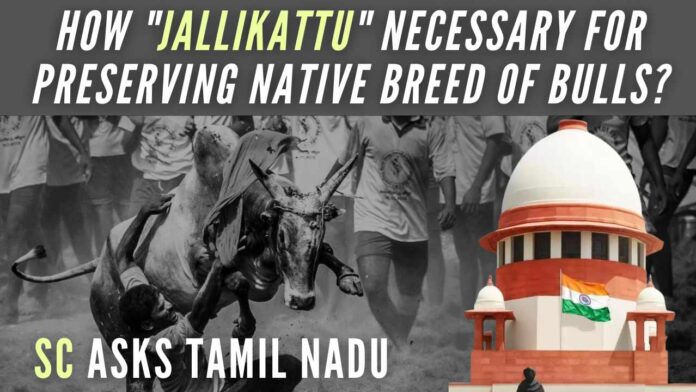
Top Court questions the use of animals in Jallikattu for entertainment of humans
The Supreme Court, which is hearing a challenge to a Tamil Nadu law allowing “Jallikattu”, on Thursday asked the state government how is the bull-taming sport necessary for preserving the native breed of bulls. “Jallikattu”, also known as “eruthazhuvuthal“, is a bull-taming sport played in Tamil Nadu as part of the Pongal harvest festival. A five-judge Constitution bench headed by Justice K M Joseph also asked the state whether an animal can be used, as in “Jallikattu”, for the entertainment of humans.
Senior advocate Kapil Sibal, appearing for Tamil Nadu, told the top court that “Jallikattu” is not per se entertainment and the person who showcases his bull treats the animal with great care and compassion. The bench, also comprising justices Ajay Rastogi, Aniruddha Bose, Hrishikesh Roy, and C T Ravikumar, asked should the animal, for whom one is supposed to have “compassion” as a constitutional value, be subjected like this for the entertainment of humans and can a State allow this on the basis of its perception of cultural rights.
“What is the basis of saying it is pure entertainment? Look at it from a historical perspective,” Sibal said, adding, a person feeds the bull every day for this event in January and he does it with great care and compassion. The bench asked, “What did he get out of this?”. Sibal responded, saying the price of the bull goes up in the market. When Sibal said the sport is not about entertainment, the bench shot back, asking “Not entertainment? Then why are people gathering there?” He responded, contending it is to demonstrate the vigour of the bull, how you have brought it up, and also how strong it is. “The whole concept that this is for entertainment is not the case at all,” Sibal insisted.
In the UPA regime, Environment Ministry headed by Jairam Ramesh supported a ban on ‘Jallikattu’ citing cruelty to animals. But later five years ago, then Congress President Rahul Gandhi went to see ‘Jallikattu’ to appreciate the culture of Tamil Nadu. Jairam Ramesh kept silent. In the NDA regime also the Environment Ministry supported the ban. After the apex court ban, the Tamil Nadu government went against the judgment and changed laws in the State to start the ‘Jallikattu’.
The apex court had, in its 2014 judgment, said bulls cannot be used as performing animals either for “Jallikattu” events or bullock-cart races, and banned their use for these purposes across the country. It had earlier dismissed the Tamil Nadu government’s plea seeking a review of its 2014 judgment banning the use of bulls for “Jallikattu” in the state and bullock-cart races across India. Tamil Nadu had amended the central law — The Prevention of Cruelty to Animals Act, 1960 — and allowed “Jallikattu” in the southern state.
Some of the petitioners had argued before the apex court that when the law prohibits cruelty to animals there cannot be an amending Act that perpetuates cruelty. During the day-long hearing on Thursday, the bench asked, “The point is how is the holding of ‘Jallikattu’ necessary for the preservation of the native breed”. It said arguments have been advanced from the petitioners’ side that in spite of whatever prohibitions are there to prevent cruelty, at the implementation level, these are not being followed.
“And actually, we will have to lay down some principle that if a law contains many preventive measures, but if in real life it is found that these are violated, then would it be open for the court to hold that these prohibitions are unimplementable and the Act remains inherently cruel,” the bench said. The top court, which also asked whether the animal has personhood, observed that one of the advocates for the petitioners has argued that every animal is entitled to dignity. “Dignity in what sense?” Sibal, representing Tamil Nadu asked.
The bench said one cannot say he will use an animal as a plaything or a toy. Sibal said it is the duty of everyone to protect nature in all forms. The bench also wanted to know about the evidence to support the claim that it is a cultural practice.
The hearing remained inconclusive and will continue on December 6. The Constitution bench had on November 24 commenced hearing arguments on a batch of petitions challenging the Tamil Nadu and Maharashtra laws allowing “Jallikattu” and bullock-cart races. The Tamil Nadu government recently told the top court that “Jallikattu” is a religious and cultural festival that bears a “religious significance” to the people of the state and does not violate the provisions of the Prevention of Cruelty to Animals (PCA) Act, 1960.
The apex court is considering five questions referred to it by a two-judge bench of the top court in February 2018. Referring the issue to the five-judge bench, the apex court had said the petitions challenging the Prevention of Cruelty to Animals (Tamil Nadu Amendment) Act, 2017 need to be decided by a larger bench since those involve substantial questions related to the interpretation of the Constitution.
PGurus is now on Telegram. Click here to join our channel and stay updated with all the latest news and views
For all the latest updates, download PGurus App.
- Subramanian Swamy approaches Supreme Court on Govt’s modification of 2G Scam Judgment to avoid auction of Satellite Spectrum - April 23, 2024
- Defence Minister Rajnath Singh visits Siachen. Reviews military preparedness - April 22, 2024
- Amit Shah’s shares in the Stock Market almost doubled in the past five years - April 21, 2024











If this is cruelty, then how is ritualistic killing of a goat that is bred specifically for that purpose not cruelty?